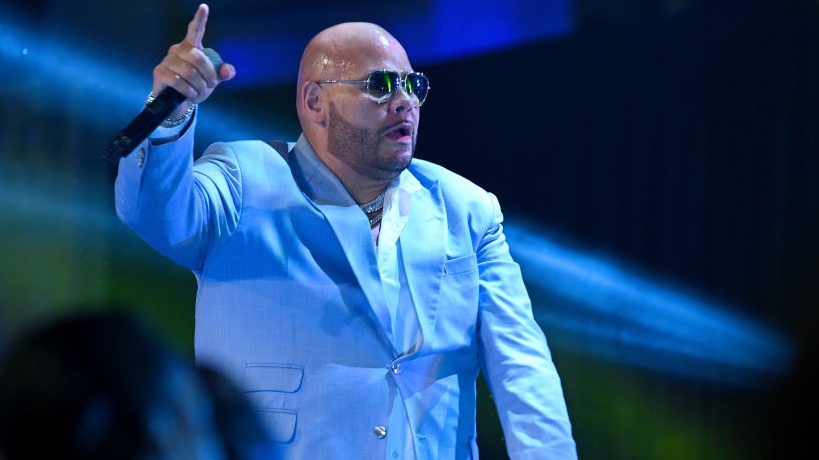Fat Joe sparked a discussion after he paid homage to Black people's influence on music and Latinx culture.
Last week, the "Lean Back" rapper discussed race in Latin America during an interview with Hot 97's Ebro Darden. Joe argued Africa's influence is prominent in Latinx music.
"All the music is African," he stated. "Brazilian music, Dominican music, Spanish drums, but you right even in Puerto Rico when you go to the Caribbean."
In Joe's eyes, all Latinx people are Black.
"Alright, let's speak about Latinos not being Black," he continued. "Latinos are Black. In Cuba, at one time, there was eight million Cubans. Five million, unfortunately, were slaves. Three million were actual Cubans, and they integrated and had babies."
The Terror Squad OG also brought religion into the conversation.
"Same thing with Puerto Rico when you go to Loíza. You talk about Santeria, that came from the Motherland Africa," he said. "Sometimes, Latinos might even identify themselves with African and Black culture more than Black people. This ain't no crazy thing. Fat Joe ain't on crack. He know what he talking about."
Joey's opinion sparked a debate about Latinx people and race.
Many agreed with his views.
Brother Joseph Cartagena , aka @fatjoe , didn’t offer an opinion when he said that the Latinx of the Spanish Caribbean are Africans. He stated a historical fact. There’s nothing to “debate” or “agree or disagree” with except how much ignorance remains for us all to get rid of.
— Greg Carr (@AfricanaCarr) September 21, 2019
He’s right. My ancestors were African Kings, Spanish Conquistadors and Taino warriors. 100% Puerto Rican ✊????????????Deny one deny them all.
— Joe ????????⚾️????????????????♀️???? (@J_Fort47) September 19, 2019
I think niggas forget the transatlantic slave trade didn’t only involve America. Even if all of them don’t act like it, Fat Joe is right. https://t.co/jr9mivPM2k
— Zlatan Negrohimovic (@OctobersOwnTae) September 20, 2019
preach @FatJoe I’ve been trying to tell my people and for so long. We are one!! As deep as our Roots within our culture, food, music and as Taino Indians we were robbed of our home #PuertoRico I have been saying #AfricatotheWorld
#afrobeatstotheworld because it’s deeper than u no pic.twitter.com/EeOJtMzezj— JadiLuc (@jadiluc) September 19, 2019
Others weren't feeling it.
what fat joe said about latinos being black isn’t entirely false, but i think we need to address the anti blackness that is deeply rooted in that community before we try to have this moment.
— ✨ Hoochie Mama ✨ (@_benjvmins_) September 21, 2019
I agree with Fat Joe when he speaks about music coming from Africa- but I don’t agree with him saying all Latinos are black because that’s just not it. Are we mixed with Africans? Yes. Are SOME of us black? YES. But is everyone? No.
— ANG ???????? ???????? (@angcode_) September 20, 2019
Latinos ain’t no damn black. At least not all of them. Just because there are black Latinos doesn’t mean they’re ALL black. Hence why there are Afro Latinos. Those are the ones that are BLACK not ALL Latinos #FatJoe we are all of one people but not one color.????
— Richard No Nickname. (@BytchImRD) September 21, 2019
by fat joe’s logic, cameron diaz and shakira can identity as black since they are both cuban and colombian. ancestry and phenotype are two different things. saying all latinos are black is ignorant considering all of the different races that make up of the community.
— alexi ???? (@_loveisking) September 20, 2019
Latin/Carribean music comes from the African diaspora in the same way American music does. If Amara De La Negra (Black) & Yalitza Aparicio (Indigenous) haven’t showed u that lots of Latinx ppl are White, ur not paying attention. https://t.co/WKs2Ifu21g
— Reagan Gomez (@ReaganGomez) September 20, 2019
Pose star Indya Moore recently told Remezcla they don't identify as Afro-Latino although they are of Puerto Rican and Dominican descent.
"I think we definitely need to come to a place where the African diaspora needs to understand that the African diaspora is the African diaspora," Moore explained. "Black Latinos don't necessarily have the same experience as Latinos who are not Black. I, personally, do not identify as Latino because Latino means Latin and Latin, it means white. And I'm not white, so I just call myself Afro-Taíno 'cause that's what I am."
Moore wants everyone to know the "boat stops" during slavery "were harmful to everyone." They want Latinx media and pop culture to reflect the diversity of the diaspora.
"When I watch Telemundo, yes, I'm here for Spanish content," they said. "But I just see only white Spanish people on Telemundo. I don't really see Black Hispanic people because Black people are also Hispanic. I think Intersectional inclusivity is important because inclusivity affirms that you belong, and I think that's something we should be pushing for in the media that we create, in all forms. For Afro-Taínos, for everybody. Everybody that's marginalized."
